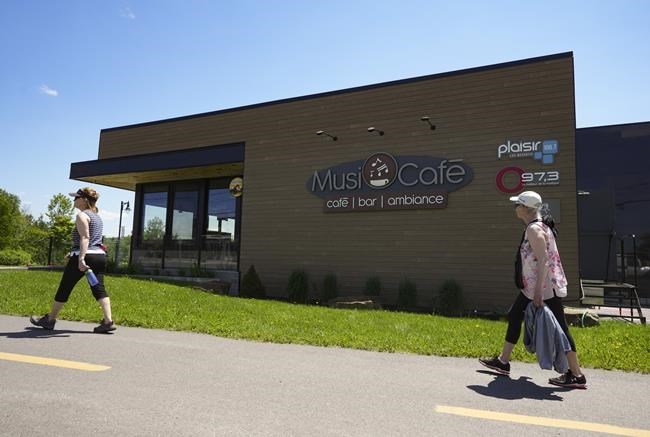LAC-MÉGANTIC — The bar that became the epicentre of the deadly train disaster that struck Lac-Megantic, Que., 10 years ago marked the sombre anniversary on Friday in much the same way it spent the hours leading up to the tragedy: with music, laughter and even joy.
Musical headliner Dany Flanders, a former contestant on singing reality show "La Voix," began Friday's tribute event at the Musi-Café with an emotional tribute to the victims and the town, set to the tune of Leonard Cohen's "Hallelujah."
However, he promised the evening would not be all sombre, and it wasn't. Within a few songs, the waitresses were dancing and the crowd was singing along as Flanders took requests and sang a birthday song for a customer.
Ten years ago, on another hot summer night, the Musi-Café bar became the focal point of the tragedy that rocked the town after an unattended parked train carrying crude oil rolled down the slope from nearby Nantes and derailed, then exploded.
Some 30 of the 47 victims who died in the disaster were in or near the bar, whose name has since become a symbol of the town's resilience, and its ongoing rebuild.
Co-owner Katie Stapels, who took over the bar last year with her partner, said she'd known the Musi-Café was important to the community -- though she's only realizing just how much. While she didn't live in Lac-Megantic in 2013, she's embraced the responsibility of owning the place that's become one of its best-known symbols.
"It's a lot of emotions, whether you lived through (the tragedy) or not," she said in an interview. "But it's certain that in taking over the Musi-Café, we have no choice but to live it."
Only weeks after the July 6, 2013, tragedy, the bar reopened in a tent, offering a series of free concerts to the population. A new permanent location opened at the end of 2014 -- though, like the rest of downtown, it bore little outward resemblance to what was there before.
In addition to immediately destroying half of the town centre, the derailment spilled six million litres of oil that seeped into the sewer system, contaminating many other buildings.
In total, about 80 buildings were demolished, encompassing 110 businesses and 100 homes, according to information by the city. The environmental damage was so significant that the downtown area didn't reopen for nearly three years.
In the meantime, the decision was made to rebuild on a nearby street -- a choice made "out of necessity" to allow businesses to reopen quickly, according to Stéphane Vachon, the city's director of economic development. Today, about 30 buildings have been built.
The former site of the Musi-Café is now a memorial that pays tribute to the victims.
Jerry Perron, a 74-year-old resident who attended Friday's show, says he misses the old Musi-Café, with its intimate corners. Mostly, he misses the location on bustling Frontenac street, with its early 1900s-era "boomtown"-style low-rise buildings and cheerful facades.
He said the new downtown is "cold" and "lifeless" by comparison, with less activity, and grey and brown buildings replacing the colourful ones. The new Musi-Café, like the new downtown, is more modern – bigger, with higher ceilings and in a stand-alone building rather than a strip.
However, he said the rebuilt Musi-Café, while different, still serves as an important symbol of the tragedy and a place where people of different generations gather.
"There are young people, there are older people like me … it’s important," he said. Frontenac, the former main street, is now a mix of empty lots, green spaces and boxy modern buildings.
The downtown still features plaques bearing pictures and explanations of historic buildings that are no longer standing, while a newly built boardwalk runs alongside the tracks where trains still rumble by, providing a daily reminder of what happened.
Vachon acknowledges that not everyone is a fan of the new downtown, which is less centralized, with fewer buildings and a modern style. "There's no textbook on how to rebuild a downtown after a train explosion," Vachon said.
He said the new design was created in consultation with residents, and incorporates elements that were important to them, such as parks and wider sidewalks.
The decision to rebuild the Musi-Café was made early on, he said. "It was kind of a symbol of a rebirth, or moving forward."
Stapels said she and her partner have made a few changes since taking over, including boosting the food offering. But she says the new bar still keeps the values of the original, including good music and providing a place for the community to gather. And, just as the Musi-Café supported residents in the wake of tragedy, she says they've returned the favour in the lead-up to the anniversary.
"They've been coming to see us for several weeks, saying 'We're coming to see you, to encourage you,'" she said.
This report by The Canadian Press was first published July 8, 2023.
Morgan Lowrie, The Canadian Press



